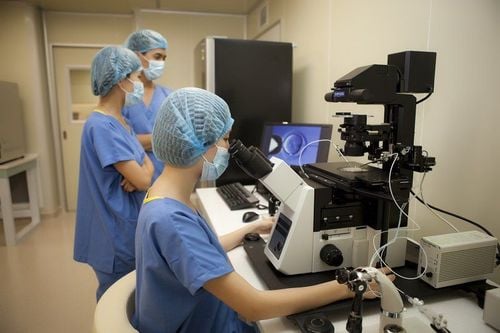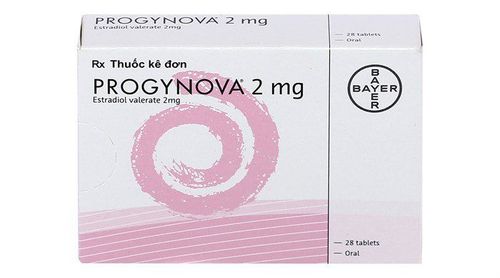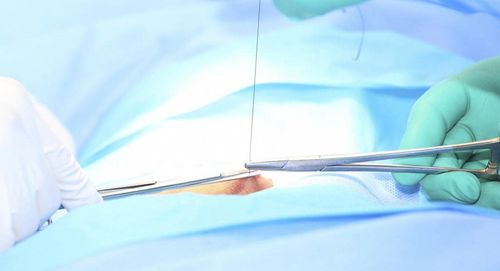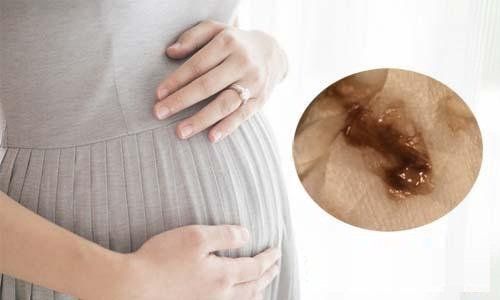This article is medically reviewed by Master's Degree, Medical Doctor Nguyễn Thị Cẩm Vân - IVF Lab Doctor at the Reproductive Support Center, Vinmec Times City International General Hospital.
Egg aspiration is a key component in the in vitro fertilization process. However, not all stages of the procedure follow in a continuous sequence; sometimes, a break may be necessary for medical reasons. In such cases, if the fertilized embryos have not yet been transferred into the uterus, the ovarian cycle will resume as normal. Despite this, many women are still unsure about when menstruation will occur after egg aspiration.
1. What is the normal menstrual cycle like?
Typically, a girl enters puberty when she experiences her first menstruation. In the following years, as the body fully develops and the hormonal system stabilizes, the menstrual cycle gradually becomes regular. A normal menstrual cycle typically lasts between 28 and 32 days, with the first day of menstruation marking day one of the cycle.
During each menstrual cycle, one of the ovaries will mature and release a ripe egg. When the egg is released from the ovary, it travels into the fallopian tube, where it is ready to meet sperm for fertilization. If fertilization occurs, a fertilized embryo is formed, which continues to divide and implant itself into the thick, blood-rich endometrial lining, where it begins to develop into a fetus.
If the egg reaches the uterus but does not meet sperm or is not fertilized, it degenerates and exits the body. The endometrial lining also sheds, resulting in menstrual bleeding. A new menstrual cycle begins.

2. What is egg aspiration in the vitro fertilization process?
If, for any reason, a woman is able to produce eggs but cannot naturally conceive, assisted reproductive technology such as vitro fertilization process is used to fertilize the egg outside the body and implant the embryo back into the uterus.
To enhance the success of the procedure, the woman is administered hormonal injections during the first half of her menstrual cycle to stimulate the ovaries. Normally, only one egg matures and is released per cycle; however, under the influence of hormones, multiple follicles may develop simultaneously. The doctor monitors the growth of these follicles via ultrasound and determines the appropriate day for egg aspiration.
Egg aspiration is a procedure in which a needle is inserted through the vaginal wall under ultrasound guidance to access the ovaries and aspirate the fluid from each follicle. The doctor will then evaluate the quality of the retrieved eggs and fertilize them with sperm previously collected, in the laboratory. After one to two days, the fertilized embryos are transferred into the uterus to begin implantation and establish a pregnancy.
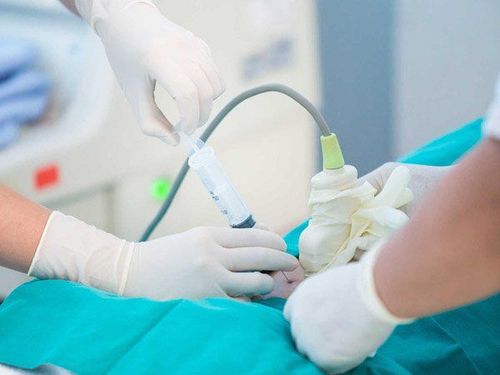
3. How long after egg aspiration will menstruation return?
If, for any reason, the woman undergoes egg aspiration only to collect eggs but is not ready to attempt pregnancy, her menstrual cycle will continue as usual after the egg retrieval.
In a regular 28-day menstrual cycle, ovulation typically occurs on day 14. Similarly, in a shorter or longer cycle, ovulation will occur approximately 14 days before the end of the cycle. In other words, if fertilization and pregnancy do not occur, the endometrial lining will shed about 14 days after ovulation, resulting in menstruation.
Therefore, even if vitro fertilization procedures involve hormonal stimulation to retrieve multiple eggs in the first half of the cycle, if no embryos are transferred for pregnancy, menstruation will return approximately 14 days after egg aspiration, often earlier than in the previous cycle.
One difference is that the amount of menstrual bleeding may be heavier than usual, and some women may experience increased fatigue, nausea, vomiting, lower abdominal cramping, breast tenderness, and weight gain. However, these symptoms are common and are considered side effects of the ovarian stimulation medications. By the next cycle, the body will return to its normal state.
Additionally, immediately after the egg aspiration procedure, or within a day or two, some women may notice light vaginal spotting. This is due to ovulation occurring and is not menstrual blood. The amount of bleeding is minimal and will soon stop. After 14 days, menstruation will occur, and the blood will have the typical characteristics of a regular period.

In conclusion, if the process of embryo transfer into the uterus is postponed, menstruation will typically return 14 days after egg aspiration. On the other hand, if menstruation appears after embryo transfer, it could be a sign that the embryo transfer failed. In such cases, the woman should inform the doctor to promptly plan for the next cycle of ovarian stimulation.
To arrange an appointment, please call HOTLINE or make your reservation directly HERE. You may also download the MyVinmec app to schedule appointments faster and manage your reservations more conveniently.





